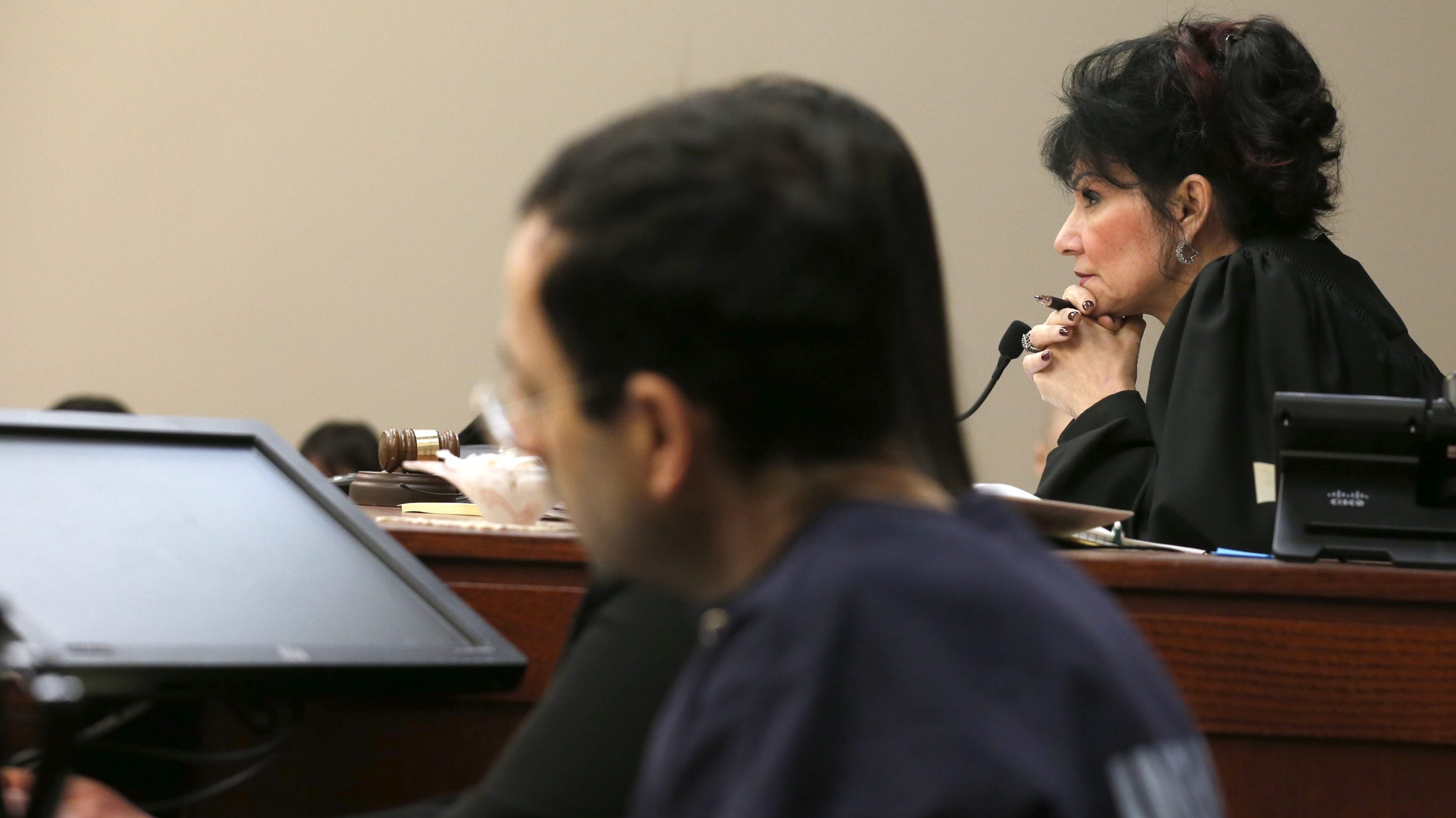Larry Nassar will die in prison. The former doctor for Michigan State and USA Gymnastics had been convicted on multiple counts of first-degree criminal sexual conduct in two different Michigan courts, as well as in federal court, after multiple women said he sexually abused them under the guise of providing medical treatment. Nassar has been appealing his sentences, whose lengths added up to what is effectively a life sentence. Last week, the Michigan Court of Appeals upheld one of those sentences by a 2-1 ruling. But beyond that, which is obviously the most important news, is a lot of legal wrangling, both in the majority opinion and the dissent, about the conduct of the judge in the Ingham County case, Rosemarie Aquilina.
In both Michigan court cases, women who said they had been abused by Nassar were allowed to speak to the court before he was sentenced. The Ingham case, overseen by Aquilina, saw more than 150 people giving statements in open court. The proceedings, held a few months after the MeToo movement began, became a national news story, with the victim-impact statements being watched by millions of people online and on TV. They also featured comments by Aquilina that could be interpreted as crossing a judicial line on judicial impartiality and endorsing prison rape. During sentencing, Aquilina told the packed courtroom: "Our constitution does not allow for cruel and unusual punishment. If it did, I have to say, I might allow what he did to all of these beautiful souls—these young women in their childhood—I would allow someone or many people to do to him what he did to others."
This, as well as other statements by Aquilina during sentencing, her appearance at the ESPY Awards, and a Facebook post, are at the crux of Nassar's appeal. His lawyers argued that they show that Aquilina was not unbiased and therefore he should receive a new sentencing hearing.
Writing as the two-person majority, judges Thomas C. Cameron and Michael F. Gadola wrote that an important factor was that Aquilina's comments came during sentencing, not during the trial and "therefore, at the time of sentencing, the 'truth-determining' portion of the proceedings concerning Nassar's guilt or innocence had ended, and Nassar was no longer presumed innocent."
Aquilina's comments about cruel and unusual punishment, however, were "wholly inappropriate," the opinion went on to say:
While a sentence judge’s language need not be tepid, see Antoine, 194 Mich App at 191, the suggestion that a judge would allow or support the physical or sexual assault of a defendant in prison, regardless of how abhorrent that defendant’s conduct may be, erodes public confidence in the judiciary and casts doubt on whether a defendant’s due process rights were followed. Certainly, the judge was well within her authority to condemn Nassar’s reprehensible conduct and impose a severe penalty given his conduct and the ages of his many victims. But inflammatory hyperbole has no place in a sentencing hearing.
But the majority opinion doesn't see this as a reason to overturn Nassar's sentence. It says, instead, "While we are obviously troubled by this comment, we note that the judge made the comment in the context of recognizing the legal constraints on the court's sentencing discretion." The opinion went on to point out that Aquilina said she would follow the sentencing guidelines and emphasized that vigilante justice isn't allowed. "Although the comments should not have been made, the judge's comments did not indicate the existence of actual bias or prejudice," the judges wrote. Other comments from Aquilina, which attracted less attention, were also deemed as not indicative of actual bias.
As for what happened after the trial, the two judges wrote that Aquilina's appearance at the ESPYs and social media postings were acceptable because that too happened after the trial, making whatever she said "commentary on matters that were not in dispute." The opinion calls the comments "unwise" but, again, said they did not rise to the level of actual bias. Aquilina's use of a laughing emoji in response to a Facebook comment "expressing disregard for whether the judge's sentencing of Nassar was within the judge's judicial right" was excused because Aquilina said she had intended the emoji for a different comment not about the case, the majority wrote. Aquilina claimed she had posted it there by accident and then deleted it.
After the sentencing was upheld, Aquilina told ESPN: "I stand by what I did. I am a voice of the public, and that's a judge's opinion."
Writing his dissent, judge Douglas B. Shapiro forcefully disagreed with his colleagues. In the very first paragraph, Shapiro writes,
"The process by which this sentence was imposed challenges basic notions of judicial neutrality, due process, the right to counsel, and the use of social media by judges. The errors at sentencing were neither minor nor isolated and by approving of them, even if reticently, the majority invites further distortions of sentencing procedures."
Shapiro disagrees with his colleagues that a judge's duty to impartiality ends between trial and sentencing. He also took issue with the sheer volume of comments made by Aquilina, both during sentencing and then afterward, that required review: "However, when such comments are repeated on multiple occasions in the course of the sentencing and then followed post-sentencing by inappropriate remarks reinforcing the appearance of impropriety, resentencing before a different judge is required."
It's worth acknowledging here that this is a lot of to-do over a small portion of the massive Nassar scandal. Even if Nassar did win this appeal, his convictions still would stand, as would the convictions and sentences in other jurisdictions. All he would gain from this appeal is a new sentencing hearing on the Ingham County charges, and I doubt that a new hearing with a different judge would suddenly give him a drastically different sentence. And yet these details are important, both for the history of the Nassar trials as well as any cases that follow. It's hard to read the force of Shapiro's words—which he surely wrote knowing how many people would read them—matched with the very real critiques of Aquilina made at the time from people working to stop prison rape as well as others in the legal community, and not wonder if Aquilina might do things differently if she could. Our courts, like any institution, function by the will of people to have faith in them. Shapiro's words read like a warning to his colleagues: All we have is our reputation, don't screw it up.
What comes next is up to Nassar's lawyers. They do have another appeal option, to the Michigan Supreme Court.
Both opinions can be read in full below.






